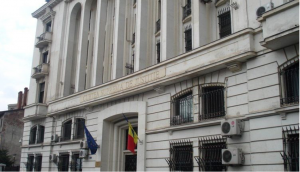By: Elizabeth Maugeri
Impunity Watch Staff Writer
STRASBOURG, France – The case of Muhammad and Muhammad v. Romania has received substantial notoriety since December 2012. Both men were living in Romania studying at Lucian Blaga University when the Romanian Intelligence Service (SRI) submitted an application to the prosecutor’s office to deem the two men “undesirable” in Romania. Adeel Muhammed had been in Romania for three months, Ramzan, almost four years; both men are Pakistani nationals.

The Romanian Intelligence Service (SRI) accused the two men of being national security threats. They were charged with engaging in activities capable of endangering national security under Article 85 §1 of the Romanian Emergency Ordinance (OUG); and also, OUGs 194/2002, sections of 51/1991, and section 44 of 535/2004; all relating to the status of aliens and safeguarding national security. The prosecutor’s office believed these charges were safe under Article 1 Protocol No. 7 of the European Convention on Human Rights on the basis that Romania’s national security was at risk, therefore expulsion was necessary.
The document presented to the Court of Appeals by the prosecutor’s office alleged a connection between the men and al-Qaeda and their involvement in activities that threatened Romania’s national security. During the hearing, the two men were never informed of the charges brought against them because the document presented by the prosecutor’s office was deemed classified. The Court determined the classified documents were admissible as evidence because of their pertinence and conclusiveness under Article 167 of the Romanian Code of Civil Procedure.
The men submitted a request for legal assistance, which the court rejected claiming that since they had failed to file before the trial began, they were unable to request legal assistance. Judgment was delivered on the same day and the men were informed that they were going to be placed in administrative custody awaiting deportation.
After the trial, in a press release, the SRI published detailed information about the case. This included the names of the men and the alleged accusations outlined in the classified documents.
The two men hired lawyers and appealed to the High Court of Cassation and Justice. They submitted a claim for breach of OUG 194/2002 Article 85 §4 in the failure to advise them of the claims; and that even though the accusations had been deemed “classified,” the SRI published them all in a subsequent press release. They submitted documents from their university as proof of good conduct. They also requested the Court obtain their bank statements showing that they weren’t financing terrorist organizations. This was necessary because neither of their lawyers held the proper certificate that allowed them to view the classified documents.
Citing Article 305 of the Code of Civil Procedure, the High Court accepted the university’s good conduct reports but rejected the request to obtain bank statements. The High Court later dismissed the case citing that based on the classified documents, it was clear that the Court of Appeals had issued a correct judgment. Adeel and Ramzan both left Romania at the end of December.
Nearly eight years after Adeel and Ramzan left Romania, the Grand Chamber of the European Commission on Human Rights issued a judgment in favor of them. It was determined that the procedural limitations imposed on the men were a violation of their Article 1 Protocol No. 7 right for procedural safeguards relating to the expulsion of aliens.
The decision was based on a multitude of questionable tactics applied by the Court of Appeals and the High Court. The Grand Chamber noted that the domestic courts never gave clear and concrete reasoning for not allowing the men to obtain knowledge as to the charges against them nor did they assess the need to withhold the information. The Chamber also stated that it was never determined that the facts provided in the Prosecutor’s claims were verified or credible. The Grand Chamber took aim at the press release acknowledging the contradictory nature of withholding the information only to release it to the public the next day. They did not believe that the press release was an appropriate way for the men to learn of the accusations against them.
The Grand Chamber further explained that Court of Appeals only provided the men the numbers of the legal provisions, not names of the laws under which the charges were brought. Neither the Court of Appeals nor the High Court informed them of their Article 1 Protocol No. 7 procedural rights or made them aware of any domestic laws or safeguards that might have aided in their defense. The mention of obtaining lawyers was never addressed during the trial, and the Grand Chamber noted that the courts failed in suggesting lawyers with the proper certification to read the classified documents.
The limitations imposed by the courts counteracted the basic rights allotted under the ECHR and significantly disadvantaged the men throughout the trial. The judgment called for Romania to pay 10,000 euros to each man and 1,365 euros jointly for costs and fees.
For further information please see: